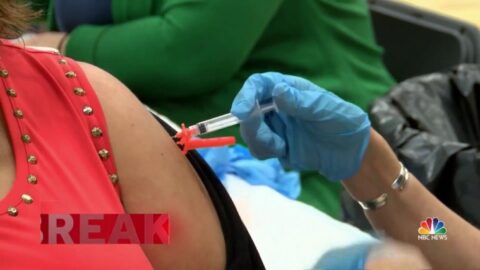
Global disease experts are monitoring a new variant, BA.2.86, that carries a large number of mutations — meaning it looks significantly different from the original version of Omicron and the previously dominant strain targeted by upcoming Covid booster shots this fall.
It’s still unclear how transmissible BA.2.86 is, though experts said it seems capable of sidestepping vaccine protection to some degree.
“We have not seen a new variant [in humans] with this many new spike mutations happening all at once since the emergence of the original Omicron,” said Jesse Bloom, an evolutionary biologist at Fred Hutch Cancer Center.
Mutations in the spike protein, one of three main parts of the SARS-CoV-2 virus, could make it easier for the virus to invade human cells.
So far, only a handful of cases of the new variant, BA.2.86, have been identified globally. In addition to one case in Michigan, the variant has also been spotted in Denmark, Israel, and the UK, according to sequences uploaded to GISAID, a global virus database.
The World Health Organization labeled BA.2.86 a “variant under monitoring” on Thursday. The designation applies to variants with an unusually large number of mutations that warrant tracking of their global spread.
The Centers for Disease Control and Prevention also said Thursday that it was monitoring the new variant, but its public health guidance remains the same.
“Based on the sequence, I think we can be very confident this [variant] is going to be relatively good at evading the antibodies that most people have from prior infections and vaccinations,” Bloom said said. “What we still don’t know is, is this variant good enough at transmitting that it will really be able to spread widely around the world?”
Dr. Dan Barouch, director of the Center for Virology and Vaccine Research at Beth Israel Deaconess Medical Center in Boston, said it’s unclear if BA.2.86 has what it takes to out-compete the current swarm of Omicron subvariants in the U.S.
“It’s not even on the list of top 20 variants on the CDC tracker,” he said. Another Omicron descendent, EG.5 — which some health experts nicknamed “Eris” on social media — remains dominant with around 20% of U.S. cases. Before that, the dominant variant was XBB.1.5, the target of new booster shots from Moderna and Pfizer.
BA.2.86 has 36 additional mutations over XBB.1.5, according to an analysis Bloom published on Thursday.
“For comparison, when we moved from Delta to Omicron, it was about 50 mutations,” Barouch said.
Bloom said scientists will know if BA.2.86 is adept at spreading if there are dozens of cases across many countries in a few weeks.
“A possible, likely scenario is it’s just an evolutionary blip and in a few weeks everybody, except for people who study the virus’ evolution like me, will have forgotten about it,” he said.
What does BA.2.86 mean for booster shots and case counts?
In the one-month period from July 8 to August 5, weekly Covid hospitalizations rose 60%, though they are historically low compared to the same period over the last three years.
But Bloom noted that BA.2.86 was unlikely to be affecting Covid case counts in the U.S. as it was identified only recently and just received a formal name on Thursday.
Barouch said the recent uptick in Covid hospitalizations is probably driven by a combination of other variants, including EG.5 or “Eris.”
The Food and Drug Administration is expected to authorize updated booster shots in the coming weeks, with CDC signoff by mid-September, CDC Director Mandy Cohen told NBC News.
Barouch said it’s too soon to tell how much protection the new shots could provide against BA.2.86, but the variant is “not a good match” for the updated boosters.
That said, experts agree that many people probably have underlying protection from severe disease already.
“It’s not like we’re going back to 2020 or 2021, where most of the world’s population actually doesn’t have any immunity to SARS-CoV-2,” Bloom said. “The vast, vast majority of people in the world have either been vaccinated or infected, often both and often multiple times.”










Recent Comments